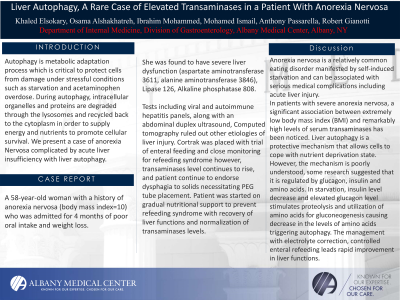Monday Poster Session
Category: Liver
P3021 - Liver Autophagy, A Rare Case of Elevated Transaminases in a Patient With Anorexia Nervosa
Monday, October 28, 2024
10:30 AM - 4:00 PM ET
Location: Exhibit Hall E

Has Audio
- KE
Khaled Elsokary, DO
Albany Medical Center
Albany, NY
Presenting Author(s)
Khaled Elsokary, DO1, Osama Alshakhatreh, MD1, Ibrahim Mohammed, MD1, Mohamed Ismail, DO2, Anthony Passarella, MD1, Robert Gianotti, MD1
1Albany Medical Center, Albany, NY; 2Rutgers New Jersey Medical School, Newark, NJ
Introduction: Autophagy is metabolic adaptation process which is critical to protect cells from damage under stressful conditions such as starvation and acetaminophen overdose. During autophagy, intracellular organelles and proteins are degraded through the lysosomes and recycled back to the cytoplasm in order to supply energy and nutrients to promote cellular survival. We present a case of anorexia Nervosa complicated by acute liver insufficiency with liver autophagy.
Case Description/Methods: A 58-year-old woman with a history of anorexia nervosa (body mass index=10) who was admitted for 4 months of poor oral intake and weight loss, and she was found to have severe liver dysfunction (aspartate aminotransferase 3611, alanine aminotransferase 3846), Lipase 126, Alkaline phosphatase 808. Tests including viral and autoimmune hepatitis panels, along with an abdominal duplex ultrasound, Computed tomography ruled out other etiologies of liver injury. Cortrak was placed with trial of enteral feeding and close monitoring for refeeding syndrome however, transaminases level continues to rise, and patient continue to endorse dysphagia to solids necessitating PEG tube placement. Patient was started on gradual nutritional support to prevent refeeding syndrome with recovery of liver functions and normalization of transaminases levels.
Discussion: Anorexia nervosa is a relatively common eating disorder manifested by self-induced starvation and can be associated with serious medical complications including acute liver injury. In patients with severe anorexia nervosa, a significant association between extremely low body mass index (BMI) and remarkably high levels of serum transaminases has been noticed. Liver autophagy is a protective mechanism that allows cells to cope with nutrient deprivation state. However, the mechanism is poorly understood, some research suggested that it is regulated by glucagon, insulin and amino acids. In starvation, insulin level decrease and elevated glucagon level stimulates proteolysis and utilization of amino acids for gluconeogenesis causing decrease in the levels of amino acids triggering autophagy. The management with electrolyte correction, controlled enteral refeeding leads rapid improvement in liver functions.
Disclosures:
Khaled Elsokary, DO1, Osama Alshakhatreh, MD1, Ibrahim Mohammed, MD1, Mohamed Ismail, DO2, Anthony Passarella, MD1, Robert Gianotti, MD1. P3021 - Liver Autophagy, A Rare Case of Elevated Transaminases in a Patient With Anorexia Nervosa, ACG 2024 Annual Scientific Meeting Abstracts. Philadelphia, PA: American College of Gastroenterology.
1Albany Medical Center, Albany, NY; 2Rutgers New Jersey Medical School, Newark, NJ
Introduction: Autophagy is metabolic adaptation process which is critical to protect cells from damage under stressful conditions such as starvation and acetaminophen overdose. During autophagy, intracellular organelles and proteins are degraded through the lysosomes and recycled back to the cytoplasm in order to supply energy and nutrients to promote cellular survival. We present a case of anorexia Nervosa complicated by acute liver insufficiency with liver autophagy.
Case Description/Methods: A 58-year-old woman with a history of anorexia nervosa (body mass index=10) who was admitted for 4 months of poor oral intake and weight loss, and she was found to have severe liver dysfunction (aspartate aminotransferase 3611, alanine aminotransferase 3846), Lipase 126, Alkaline phosphatase 808. Tests including viral and autoimmune hepatitis panels, along with an abdominal duplex ultrasound, Computed tomography ruled out other etiologies of liver injury. Cortrak was placed with trial of enteral feeding and close monitoring for refeeding syndrome however, transaminases level continues to rise, and patient continue to endorse dysphagia to solids necessitating PEG tube placement. Patient was started on gradual nutritional support to prevent refeeding syndrome with recovery of liver functions and normalization of transaminases levels.
Discussion: Anorexia nervosa is a relatively common eating disorder manifested by self-induced starvation and can be associated with serious medical complications including acute liver injury. In patients with severe anorexia nervosa, a significant association between extremely low body mass index (BMI) and remarkably high levels of serum transaminases has been noticed. Liver autophagy is a protective mechanism that allows cells to cope with nutrient deprivation state. However, the mechanism is poorly understood, some research suggested that it is regulated by glucagon, insulin and amino acids. In starvation, insulin level decrease and elevated glucagon level stimulates proteolysis and utilization of amino acids for gluconeogenesis causing decrease in the levels of amino acids triggering autophagy. The management with electrolyte correction, controlled enteral refeeding leads rapid improvement in liver functions.
Disclosures:
Khaled Elsokary indicated no relevant financial relationships.
Osama Alshakhatreh indicated no relevant financial relationships.
Ibrahim Mohammed indicated no relevant financial relationships.
Mohamed Ismail indicated no relevant financial relationships.
Anthony Passarella indicated no relevant financial relationships.
Robert Gianotti indicated no relevant financial relationships.
Khaled Elsokary, DO1, Osama Alshakhatreh, MD1, Ibrahim Mohammed, MD1, Mohamed Ismail, DO2, Anthony Passarella, MD1, Robert Gianotti, MD1. P3021 - Liver Autophagy, A Rare Case of Elevated Transaminases in a Patient With Anorexia Nervosa, ACG 2024 Annual Scientific Meeting Abstracts. Philadelphia, PA: American College of Gastroenterology.
